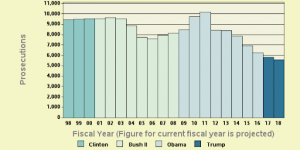
Overview
The Transactional Records Access Clearinghouse (TRAC), housed at Syracuse University, researches and distributes data about the federal government’s enforcement work. As TRAC itself explains, it seeks to answers questions about government enforcement work – questions that burn in the souls of lawyers who defend companies and people being investigated or prosecuted for crimes or regulatory violations. Like: How many white-collar cases are filed? Which jurisdictions are they filed in? What crimes is the government prosecuting? Is the government prosecuting more or less white collar crimes than it has in the past?
TRAC does a lot of digging through government records, relying primarily on the Freedom of Information Act (FOIA), to obtain the information it needs to publish its insightful reports.
Recent TRAC reports on white-collar crime and corruption prosecutions show that over the last twenty years there has been a steady decline in prosecuting these cases.
To appreciate these reports, you must understand that in keeping its statistics, the U.S. government differentiates white-collar crime from corruption. The FBI defines “white-collar crime” as all types of fraud and financial crimes that business and individuals engage in where someone is illegally trying to get money or assets or some other personal or business advantage or avoid losing the same.
The FBI considers corruption to be criminal activity related to public officials violating laws like bribery, procurement fraud, election fraud, conflicts of interest and other crimes that impact the integrity of government operations or use of public funds.
With that let’s look at what TRAC’s data mining shows about trends in prosecutions of white-collar crimes and corruption over the 20 years.
White-Collar Prosecutions
Earlier this year, TRAC reported that white-collar prosecutions are at a twenty-year low. As of April 2018, according to TRAC, the government has filed 4.4% fewer white-collar crime cases than it did in 2017; 33.5% fewer than it did five years ago; and 40.8% fewer than it did 20 years ago. TRAC’s chart, which depicts the number of white-collar prosecutions since 1998, shows that after peaking in 2011, white collar crime prosecutions have slowly declined.
TRAC’s cool chart shows not only the years and number of prosecutions but, the presidential administration at the helm during those years:
So, who is investigating these crimes? According to TRAC for 2018, as expected, the FBI is investigated the majority of white-collar crime cases – 32.7%; the feared IRS and the Secret Services handled about 10% of the investigations; and, the Postal Service (yes – U.S. Post Office has agents to investigate crimes) investigated about 9% of the cases.
Fraud of every type, from identity theft to insurance, health care and banking fraud is the majority of the cases that the government investigates.
Of the fraud crimes, “Fraud by Wire, Radio, or Television,” commonly known as Wire Fraud was the most frequent lead charge in a criminal case (it’s important to note the “lead’ charge because in most criminal cases there are a number of charges files in each case, not just one) as it was a year ago and five years ago. Conspiracy to commit fraud offenses followed for the top crimes prosecuted. TRAC says that conspiracy prosecutions have declined by 58% from five years ago.
Further, and no surprise, is that the famous Southern District of New York (Manhattan) handled the most white-collar prosecutions, 937, followed by the Southern District of Florida (Miami) with 574 white-collar prosecutions. Last year, the Southern District of New York placed second behind the Southern District of Florida, just as it did five years ago. The Eastern District of Missouri (St. Louis) is now ranked 3rd.
Corruption Prosecutions
TRAC’s data shows that corruption prosecutions also continue a downward trend. DOJ is on track to prosecute 23.5% fewer corruption cases than it did last year; 41.7% fewer than it did five years ago; and 59.1% fewer than it did in 1998. Again – TRAC’s cool chart divided by years, and by presidential administrations, is a clear visual of the steady downward trend in corruption prosecutions:
The types of corruption cases, as categorized by the government, includes corruption related to federal, state, and local governments, as well as corruption related to procurement and federal programs. Through August 2018, most prosecutions for 2018 were of local government officials – 32.9%. State officials accounted for about 10.9% of the corruption prosecutions. The other prosecutions were of federal officials or related to procurement or federal program fraud. About 12.9% of the corruption prosecutions were not broken down by federal, state or local, and so may include FCPA prosecutions, although it is not clear from the records.
The FBI investigated 49.7% of these cases. The rest are investigated by other federal agencies.
The number one leading corruption charge is theft or bribery in programs receiving federal funds. It was the most prosecuted corruption crime a year ago, five years ago and ten years ago.
As in the white-collar prosecutions, conspiracy was the second most prosecuted corruption crime.
The biggest decline in corruption prosecutions from a year ago, down 60% — was bribing public officials and witnesses. Corruption prosecutions for bribery is down 60% from five years ago.
The District of Washington D.C. handles the most corruption cases per capita. Not a surprise given that the federal government sits in D.C. and in many instances DOJ prosecutors may have the legal prerogative to bring corruption cases in D.C. Second up is Montana.
TRAC’s data, interesting and informative as it is, does not answer whether the drop in white collar and corruption prosecutions is a good thing or bad thing; but in my opinion, it sure does not mean there is less fraud and corruption.
From my perspective, putting my white-collar defense propensity of believing that the government should be held in check given its propensity to trample on liberties….
I do think a quote from William Shakespeare’s play Measure for Measure – gives us the answer:
“I have seen corruption boil and bubble ’til it oerrun the stew.”


